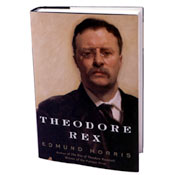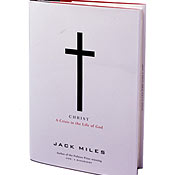
To read about Theodore Roosevelt in the age of George W. Bush is not an experience I would recommend to the easily depressed. The two men have, in fact, been linked lately: In the wake of both September 11 and the publication of Edmund Morris’s Theodore Rex, much has been made of the similarities between September 1901, when Roosevelt acceded to the presidency, and September 2001, the first great crisis of Bush’s term. Both Septembers saw unexpected attacks in New York by foreign fanatics, both witnessed a nation plunged into grief and anxiety about national security, and both searingly tested relatively young chief executives who were new to their jobs. (Vice-President Roosevelt became president on September 14, 1901, after William McKinley was assassinated in Buffalo by an anarchist.)
But as will be all too clear to anyone who reads the superb second installment of Morris’s proposed three-volume biography, comparisons between the two figures are superficial. Even at his best, Bush comes off as tinny and inauthentic, when not downright inarticulate – a man who’s always parroting, none too convincingly, words that have been all too obviously written for him. Compared with him, the maniacally active, garrulous, prolific, and charming Roosevelt – who read French and German, was an amateur boxing champion, invented a private system for transcribing birdsong, wrote fifteen books and read another 20,000, was a renowned authority on American game animals, climbed the Matterhorn, founded a society for the conservation of hunting and a finance club – seems to belong not to another century but to another species.
The new book, which is every bit as richly detailed and imaginatively written as its 1979 predecessor, The Rise of Theodore Roosevelt, makes clear how much happier Morris is dealing with the outsize personalities of the nineteenth century than with the miniaturized, televised public figures of our own day. Indeed, it’s no accident that the first volume of Morris’s trilogy won the author a Pulitzer, while his controversial and idiosyncratic Dutch, a biography of Ronald Reagan – a president every bit as processed, prepped, and packaged as the current chief executive – won him only notoriety. Stumped by the intractable mystery of his slippery subject, Morris decided on a risky, rather nineteenth-century-novelistic strategy: He made himself a character in Reagan’s story, using the double narrative to gain some traction on a man who seemed merely a scrim for projected fantasies.
There is no reason to do anything like that with Roosevelt, whose very real intellectual and physical appetites were positively Falstaffian. The present volume of Morris’s biography is dedicated to the White House years – a crucial eight years in the nation’s history. Between 1901 and 1909, when he left office at the Clintonian age of 50, the hyperactive Roosevelt (“You must always remember that the president is about 6,” his old friend Cecil Spring Rice once observed) fundamentally redefined the nature of the American presidency. At home, this scion of wealthy old New York vigorously pursued legislation to improve working conditions, intervened on behalf of striking workers, was the first president to entertain a black man (Booker T. Washington) at the White House, defended his beloved wilderness from the onslaughts of unregulated industrial expansion, and, most famously, became the superhero-esque “Trust Buster,” dismantling, with the help of his Justice Department, hugely profitable monopolies. And abroad, he achieved notable diplomatic triumphs – he won the Nobel Peace Prize for negotiating a truce between the Russians and the Japanese in 1904 – thereby elevating the United States to the level of a world power.
But if Theodore Rex is so engaging, it isn’t merely because of the eventfulness or colorfulness of T.R. or his presidency. Yes, Morris the would-be novelist withdraws to a respectful distance in the new book – no need to inject imaginative texture in this life story – but he hasn’t, thankfully, quite disappeared. What distinguishes Theodore Rex is, if anything, not the copious research (there are 180 pages of notes) but rather its deeply novelistic construction, the numerous writerly touches, and the acts of emotional sympathy more typical of fiction than of nonfiction. An example is the extended scene of Roosevelt’s train journey from upstate New York, where he learned that he’d become president, back to Washington. T.R.’s perusal of the newspapers allows for extended digressions by Morris about the state of world affairs; passing glimpses of oil wells give way to ruminations about the state of industry and the environment. Similarly, Morris’s masterly narration of T.R.’s first State of the Union address – the speech in which he essentially announced his new war on trusts – is a tour de force in which paraphrases of the speech are interwoven with descriptions of the various senators with whom he’d soon be doing battle.
Such innovative narrative strategies allow the author to integrate a tremendous amount of information while remaining graceful and gripping. Add to this some beautiful smaller touches (the young, pre-presidential Roosevelt is likened to “a bee smacking against many surfaces before buzzing into the open air”), and you wind up with a biography that’s as good as fiction. This much Morris himself seems to realize. “Horatio Alger could not get away with such a story,” he writes after summing up T.R.’s early years. Maybe it’s not Alger; but Morris has created as gripping a narrative that is well suited in heft, temper, and tone to its vivid subject.

Jack Miles’s second effort, like Morris’s biography of Reagan, loses itself in an elusive subject. Christ: A Crisis in the Life of God, is a sequel to the author’s 1995 Pulitzer-winning God: A Life, in which the author, a former Jesuit, saw God as the troubled, “blind,” and “weak” hero of a fat nineteenth-century novel – a difficult, cantankerous deity who had to grow into a hard-won maturity by “using and misusing” his own power. The thesis of Miles’s new book flows from that portrayal: In Christ, Miles argues, God chose to incarnate himself and suffer humiliation, pain, and execution as a self-chosen punishment for his own excessive harshness to the human race in the past. But while this “emotionally inescapable implication of the Christian myth” is bound to fascinate and provoke, the scattered, repetitive quality of the writing here is unlikely to persuade many, despite a number of dazzling displays of academic virtuosity. (Miles’s exegesis of the story of Jesus’ conversation with the Samaritan woman at the well is replete with racy nuances that only a scholar of ancient languages could tease out.) For all the fireworks, you never get a real sense of why this book is needed. At one point, Miles cites Jorge Luis Borges’s assertion that Christ’s life story cannot be told better than in the Gospels. Whatever its intermittent fascinations, Miles’s own book only serves to prove this.
Theodore RexBy Edmund Morris
Random House; 772 pages; $35.
Christ: A Crisis in the Life of God
By Jack Miles
Alfred A. Knopf; 352 pages; $26.95.